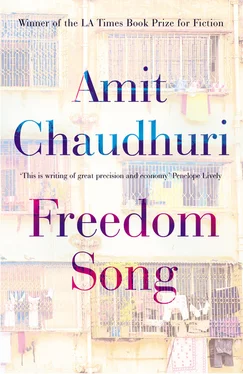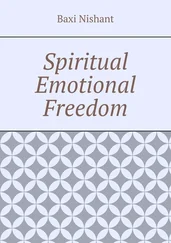The blue sky’s forehead
Is smeared with sandal,
And the pair of swans that belong to the forest
Of words have spread their wings.
She sang these lines again, for she hadn’t got them quite right the first time. After their father’s death, their mother had sold the gramophone while she was selling other things that belonged to them. Later, whenever they wanted to listen to the gramophone, they would borrow it from Shib’s family, who were rich landowners who did not keep too close a track on their belongings, and they would keep it and a stack of records with them for days.
It had been a strange, an impossible childhood. Their father dead, their mother trying to look after them all, and they — the three youngest ones, Pulu, Bhola, and Khuku — brought up, in effect, by the older sister, who had died last year, an older brother, who had died in Shillong two years ago, another older brother, who had died more than sixty years ago, when he was only thirty years old, of an incurable heart disease — three tyrants — and Borda.
Khuku had longed to sing as a child; but it was Bhola who was always singing when they were children. So Khuku waited shyly in the background as a girl should. Their elder sister bought Bhola a harmonium, but Bhola was too impatient to sit and play it; and it was Khuku, not Bhola, who learnt how to play.
It was an L-shaped house, whose inner and outer dark declivities were indelibly etched within her, to which they’d moved a year after their father had died, their mother taking charge of everything, and there she would often practise on the veranda. But she began practising seriously only when she was in Shillong, sometimes early in the morning, going into another room so as not to wake the others, and her brothers would tease her and call her ‘Bijonbala Ghosh Dastidar!’ after the famous classical singer. Yet she had an intent and determination that seemed to see far into the future.
Almost no one had the privilege of listening to her these days except her husband and Suleiman or those who happened to be near, including Jochna and Nando. Not infrequently her old records were played on the radio, and that voice ringing as it used to be would fill the air.
When she finished the song, she began another one immediately, almost impatiently. And all at once she noticed Suleiman before her.
All of last month had been an embarrassment to him; as if he’d been transformed into a creature of peculiar and noticeable appearance. And it was as if he was surprised that he was still here, leading the same life he’d led before in Park Circus two months ago.
As for Khuku, she was often in a state of irritation. Only recently she’d been woken up again by the azaan, and at first she had thought it was a mosquito humming near her ear. It grew louder, and then faded, and then grew louder again; its note swelled faintly and then diminished, just as when a mosquito hovers above one in indecision. Then she realized what it was. Where is it coming from? she wondered. It must be Park Circus, from one of those lanes above which the minarets rose. It reminded her that there were altogether too many Muslims around her. Sometimes, in the afternoon, the sound hovered in the middle air, and, if she were passing by in the car, she could sometimes hear two different voices at different pitches; as one came closer, they filled the air.
‘Is it necessary for all the world to hear it?’ she had asked later.
Suleiman had explained himself and his faith apologetically, the tablas balefully silent before him. ‘It is the word of God,’ he said, shamefaced and tender about this perpetual nuisance.
See how stubborn they are, she thought; and just the other day they were quaking with fear.
It was more than three weeks since that conversation had taken place.
‘Which song, Didi?’ he asked.
She did not answer; not because she did not mean to, but because she was asking precisely the same question of herself, and thus had not heard him. She began a familiar song:
Lost heart
On a verdant road
I gather strewn flowers
By myself
Park Circus; Shamsul Huda Haq Road. A pharmacy and a sweet shop at its entrance. Only a twenty minutes’ walk from Khuku’s house.
During their festivals, sweets made of semolina were left in platters and distributed; they prayed here; marriages were made; they had their own butchers’ and tailors’ shops. They had their own school for the blind and their madrassas. Children and women in saris and in burkhas, maulvis and music teachers and private tutors and businessmen all mingling under storeys that were heaped one on top of the other.
It was not many days after the performance and already a meeting was arranged between Bhola’s family and the Duttas. ‘The Duttas are a good family,’ said Bhaskar’s mother, though she did not know the Duttas. The Duttas had a daughter. When, at the end of the month, the meeting with the ‘girl’ and her parents was set to take place at an open-air café near Salt Lake, Bhaskar, oddly, seemed both indifferent and co-operative and full of nimble self-assurance.
That very day, however, he’d said he’d have to go to a meeting. Bhaskar’s mother had met this observation with coolness. ‘Go, then. We’ll be able to make another arrangement.’ The café was new and appeared largely unfrequented and lit by large lanterns and set against a lake. Had it been designed in its flickering anonymity specifically with meetings such as this one in mind? Bhaskar wondered. The bypass leading to the airport ran next to it; and at this time the bypass was illuminated principally by headlights. Bhaskar’s mother, her sari drawn around her to protect herself from the breeze that blew towards them from the dark, asked for Gold Spot (because it was a fairly long time since she’d had a soft drink); so did Piyu; but Bhola and the girl’s parents said ‘Thums Up’ to the waiter. The darkness that surrounded them had in the morning been water and land and a fragment of sky. The drinks eventually came towards them on a tray and gravitated above the table. There were no other customers except a couple in the distance, who had no doubt come here for their own reasons, looked recently married, and kept glancing, whether with curiosity or displeasure it was difficult to tell, at the two families. Suddenly, taking Bhaskar aback, Bhola offered that Bhaskar and Anusuya, for whose sake this rendezvous had been arranged, sit at another table so that they could ‘talk amongst themselves’. Heavily Bhaskar got up; lightly Anusuya, though she was overweight, got up; and made for the neighbouring table, as if they would become invisible to the others once they sat there. Bhaskar had decided that he would not, could not marry this girl. She reminded him of a schoolfriend he used to have, a boy called Anilesh. But he was determined to be polite, as polite as he ever was; and he almost felt a surge of affection for her when she asked the waiter for ice-cream. Bhaskar sipped Thums Up non-committally from a straw. They must have grown up simultaneously, in schools not far from each other; and now they were both in the twilight world of being unmarried. They seemed resigned and happy to be enjoying their orders.
‘What do you think?’ asked Bhola on the way back.
‘What should I think?’ said Bhaskar. ‘We didn’t speak. She was busy eating ice-cream.’
And Bhaskar, after a gap of five days, resumed going to the factory. He left agitated and late in the morning after a meal of fish and rice.
The factory — time had not dulled the route to it nor made it easier — took an hour and a half to get to by car; it meant crossing the Howrah Bridge; then passing through places that were neither towns nor outposts, but that had names; and negotiating a bad road. Neither tree nor bird in sight, nothing but the little stalls one left behind with pictures of Krishna in them; this was the road to Howrah. By train, it took a little less time.
Читать дальше












